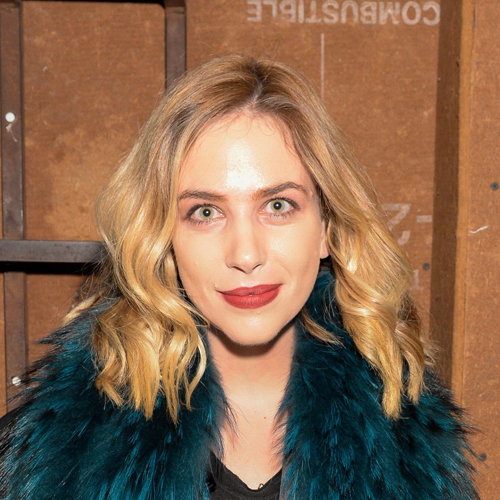Let’s get something straight: Rose McGowan is a modern-day warrior. If you still somehow think of her as the former Charmed actress who once dated Marilyn Manson, you haven’t been paying attention. Perhaps you missed her rousing speech at last year’s Women’s Convention, or you haven’t caught her tweets regularly (and often controversially) calling out hypocrisy and injustice in Hollywood and beyond. It’s hard to imagine her ongoing crusade against Harvey Weinstein, which earned her a spot among Time’s Person of the Year lineup, has escaped you entirely, but in case you need a primer on McGowan, #MeToo and the Rose Army, her new reality show-cum-docuseries, Citizen Rose, provides just that—as well as a glimpse into what #MeToo-related entertainment might look like in the months to come.
While the hour-and-a-half-long first episode premiered a few weeks ago on E!, the following four episodes won’t air until this spring, so you have plenty of time to ruminate on the many strings it tugs at, which include McGowan’s complicated relationship with her family, the uncomfortable realities of being the face of a movement and the very real consequences of speaking truth to power. Releasing the debut episode early was a pretty clear bid to promote McGowan’s memoir, Brave, which hit shelves the same day, yet it nevertheless serves as a timely and, for many, much-needed summation of the sexual assault allegations, and resultant feminist reckoning, that has dominated the headlines since the New York Times and the The New Yorker published their exposés on Weinstein last October.
The show quickly establishes McGowan’s life story as equal parts fascinating and horrifying. Heavily emphasized is the tragic irony in the fact that McGowan spent much of her childhood among a misogynist cult called Children of God, which her father only agreed to leave after they began promoting pedophilia, to find herself in Hollywood, another kind of male-dominated cult, where cookie-cutter notions of female beauty and docility are prized above all else. But thankfully, Citizen Rose doesn’t focus solely on McGowan and her story. After all, a crucial aspect of the #MeToo and Time’s Up movements has been an acknowledgment of privilege and an emphasis on lifting up women who don’t have the kind of platform those like McGowan and her famous allies enjoy (the show contains cameos from journalist Ronan Farrow and actresses Asia Argento and Amber Tamblyn).
Early in the episode, McGowan marches against domestic violence with the East LA Women’s Center and then interviews a small group of survivors associated with the non-profit. “Everything started as a child, I’ve been through every [type of] domestic violence, sexual assault, molestation,” one of the survivors reveals. “So, at a young age, I learned to just [make myself] numb.” The women engage in a tearful group hug as McGowan whispers to them, “you’re not alone.” It’s a scene that might feel exploitative if not for McGowan’s sincerity. When she tells these women they’re not alone anymore, that she’s going to use her position of power to help them, you can tell that it’s coming from the heart. It’s the first of many moments that feel startling in their rawness, if for no reason other than that we’re not used to seeing E!'s brand of reality television actually reflect, you know, reality in such an authentic manner.
“Rose Army isn’t about my name at all,” McGowan says later on. “I saw these roses once growing through sidewalk cracks and I just thought, hell, so many disenfranchised people had to grow through these cracks. And the thorns, they carry weight.”
Acknowledging McGowan’s relative privilege, given the fact that she’s white, cisgender, famous, traditionally beautiful and financially stable, is crucial. But the show also offers a very real glimpse into everything she’s sacrificed to become the face of a controversial new movement. Following his initial report on Weinstein, Farrow published a follow-up in The New Yorker that detailed Weinstein’s efforts to silence McGowan, as well as reporters and other victims, which included hiring private investigators from Black Cube, an intelligence agency run by former Mossad agents. McGowan expands on these allegations on the show, claiming she’s been followed and her house had been bugged—statements that might seem paranoid if not for the fact that, according to Farrow, they “fact-checked out.”
“If you had said the things that I said in my article about Black Cube and spies going after you, everyone would have just said you were crazy,” Farrow says to McGowan during a conversation at her home. “And did, for some time.”
The show also shows some of the aftermath of McGowan’s arrest in January 2017 after being accused of leaving a wallet containing cocaine on an airplane in Virginia. She has dismissed the allegations via Twitter as “a load of horseshit” orchestrated to keep her silent, and is shown towards the middle of the episode walking into a courthouse in November to plead not guilty to the charges.
“If having an international ring of spies against you is not enough to convince you of my innocence, I don’t know what I can do,” she quips to the camera, before entering the courthouse.
As impressive and genuinely likable as she comes off, McGowan is nevertheless what many are calling an "imperfect victim." She's angry, and she has every right to be. But in her efforts to topple the patriarchy that has kept her, and women like her, down for so long, she's guilty of making some unfortunate mistakes. One particularly upsetting example came just last week, when she reportedly lashed out at a trans woman during a promotional event for Brave at Barnes & Noble. Like its protagonist, Citizen Rose is a program that's striving hard to be many things at once. It's a celebrity biography, a primer on one of the most consequential social justice movements of our time, a portrait of a flawed, yet awe-inspiring victim and a window into the newly-exposed underbelly of Hollywood. Whether it will ultimately succeed at telling all of these stories in a meaningful way is yet to be seen, just as it is yet to be seen whether McGowan's personal shortcomings will undermine the importance of her harrowing story and good works.
What's evident already, however, is that Citizen Rose is a compelling example of what reality television—and, by association, celebrity itself—could be in this wake of this watershed moment for women. For while a docu-series that addresses real-world issues is far from revolutionary, one that also draws heavily on the reality television tradition, particularly those made for E!, certainly is.
The chief complaint about Citizen Rose is likely to be that it’s painfully real (ironic, given its aims) and, at times, straight-up hard to watch. Hopefully, people—especially those less well-versed in what #MeToo and related movements are all about—will do so, anyway. It's a welcome reflection of the times that even a network like E!, known for its playful vapidity, wants to get in on the feminist moment. There's plenty to get cynical about there, but at the end of the day, do the network's motives for green-lighting the show really matter if it means an important cause is getting airtime on a hugely visible platform? In this particular case, probably not. McGowan is an executive producer on Citizen Rose, and it's clear she's had a big say in how the show will look and sound, much to its benefit.
And yet the very existence of what's basically been dubbed the first #MeToo reality show—implying, then, that there will likely be more—does get at an uncomfortable truth, about the inextricable relationship between Hollywood's burgeoning feminist agenda and the industry that has spawned it. Certainly, the money and awareness about sexual misconduct and related issues raised by Hollywood over the past several months have been positive forces for change; one hopes they will continue to be so. But as soon as someone like McGowan is taken out of the driver's seat and replaced with an executive more concerned with ratings than telling a real story, a bastardization of the movement is liable to arise. It's a delicate balance between money, power and truth. Just like Hollywood itself.
Until then, though, let's take joy in the fact that there's a program on one of the most mainstream of mainstream cable networks that allows someone like McGowan to ask questions like this one, which she poses at the very beginning of the episode: “Do I make you feel uncomfortable? Good.” After all, Hollywood has long been a place of suppressed discomfort. It's high-time more of its output, especially that which labels itself “reality,” reflected as much.






